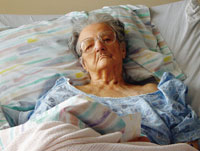
Inadequate staff training and an impersonal approach to care are blighting the experiences of dementia patients in hospitals, a major national study has concluded.
Just 32% of hospital staff in England and Wales said they had received sufficient training in dementia care while very few wards demonstrated person-centred care, found the National Audit of Dementia, whose first full report was published today.
The audit, led by the Royal College of Psychiatrists’ Centre for Quality Improvement, was based on data collected from 210 hospitals across England and Wales, involving 105 observations of care on wards and responses to 2,211 staff questionnaires.
It found that while the majority of wards met basic safety requirements, care was often delivered in an impersonal manner, with staff not greeting or talking to patients, explaining what they were doing or responding to patients’ requests for help.
Staff did not fully understand the needs of patients with dementia because of the lack of training, the audit concluded. Half of staff said they had not received sufficient training in communicating with people with dementia and 54% said they had not received sufficient training in dealing with challenging or aggressive behaviour.
The audit, which also drew on the work of Alzheimer’s Society, the Royal College of Nursing and the British Geriatrics Society, called for all staff to be provided with basic training in dementia awareness; staffing levels to take account of the additional support needs of people with dementia; a senior clinical lead for dementia to be appointed in each hospital, who would identify dementia champions in each ward and hospital department; and for all ward managers to make sure staff involve patients with dementia in discussions on care.
The report is the latest in a long line of highly critical studies on the quality of hospital care for older people in general and those with dementia in particular across Britain:-
- A Care Quality Commission study of 100 hospitals in England, published in October, found one in five was failing to meet essential standards on dignity or nutrition.
- The health ombudsman concluded that the NHS was failing to treat older people with dignity, respect, care or compassion, in a report in February based on 10 cases.
- The Older People’s Commissioner for Wales found that Welsh hospitals were failing patients with dementia in a report in March this year, including because of inadequate staff training.
- In the same month, the Mental Welfare Commission for Scotland said that hospitals were treating patients with dementia unlawfully by failing to apply safeguards for those who lack capacity to consent to treatment.
- A November 2009 study by Alzheimer’s Society found people with dementia were spending longer in hospital than others admitted with the same medical condition and leaving wards in a worse state than when they went in.
Responding to today’s report, Alzheimer’s Society chief executive Jeremy Hughes said: ‘This shocking report proves once again that we urgently need a radical shake-up of hospital care.
“Given that people with dementia occupy a quarter of hospital beds and that many leave in worse health than when they were admitted, it is unacceptable that training in dementia care is not the norm. Staff want to be empowered with the tools they need to deliver good quality care to people with dementia.
“Being in hospital is often confusing and frightening for people with dementia, but small changes can help make their stay more comfortable.”
The UK government has made dementia care a priority for the NHS in England through its NHS Operating Framework 2012-13.
Related articles
Dementia training lacking in most hospitals, study shows
Financial abuse of dementia sufferers is rife, warns charity

 Bournemouth, Christchurch and Poole
Bournemouth, Christchurch and Poole  Hampshire County Council
Hampshire County Council  Lincolnshire County Council
Lincolnshire County Council  Norfolk County Council
Norfolk County Council  Northamptonshire Children’s Trust
Northamptonshire Children’s Trust  South Gloucestershire Council
South Gloucestershire Council  Wiltshire Council
Wiltshire Council  Wokingham Borough Council
Wokingham Borough Council  Children and young people with SEND are ‘valued and prioritised’ in Wiltshire, find inspectors
Children and young people with SEND are ‘valued and prioritised’ in Wiltshire, find inspectors  How specialist refugee teams benefit young people and social workers
How specialist refugee teams benefit young people and social workers  Podcast: returning to social work after becoming a first-time parent
Podcast: returning to social work after becoming a first-time parent  Podcast: would you work for an inadequate-rated service?
Podcast: would you work for an inadequate-rated service?  Family help: one local authority’s experience of the model
Family help: one local authority’s experience of the model  Workforce Insights – showcasing a selection of the sector’s top recruiters
Workforce Insights – showcasing a selection of the sector’s top recruiters 

 Facebook
Facebook X
X LinkedIn
LinkedIn Instagram
Instagram
Comments are closed.